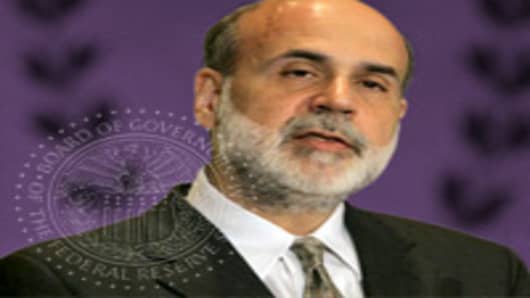The Federal Reserve cut its forecast for economic growth in 2008 and warned of higher inflation and unemployment. But it also signaled it was unlikely to cut interest rates again soon.
"Several members noted that it was unlikely to be appropriate to ease policy in response to information suggesting that the economy was slowing further or even contracting slightly in the near term," the Fed said in minutes of its April 29-30 meeting.
In an accompanying forecast, the Fed cut its projection for economic growth to scant 0.3 percent to 1.2 percent in 2008, down from 1.3 percent to 2 percent it estimated three months ago.
At the same time, the central bank said it expects inflation to remain "elevated" and unemployment to increase "significantly."
Fed officials believed that cutting benchmark interbank lending rates by a quarter percentage point to 2 percent at their last meeting was "a close call."
Policy-makers felt at the time that the risks that growth could slow were more closely balanced by the risks that inflation could spike higher.
"Members were ... concerned about the upside risks to the inflation outlook, given the continued increases in oil and commodity prices and the fact that some indicators suggested that inflation expectations had risen in recent months," the Fed said.
The Fed warned that the risks to its scaled-down growth projection remain to the downside, particularly if house prices continue to slide lower.
"Participants saw little indication of a bottoming out in either housing activity or prices," minutes of the central bank meeting said.
"If you had any doubt that the Fed is signaling a pause, that doubt is gone," said Christopher Low, chief economist at FTN Financial in New York.
A Fed governor reinforced that view earlier Wednesday, saying the Federal Reserve must protect its inflation-fighting credibility and should resist "reflexive" calls to cut interest rates further if growth weakens.
Fed Board Governor Kevin Warsh said the U.S. central bank had lowered rates considerably to offset the shock of the housing crisis, and it was now time for the private sector to continue the healing process.
"Even if the economy were to weaken somewhat further, we should be inclined to resist expected, reflexive calls to trot out the (interest rate) hammer again," he told the Exchequer Club in Washington.
The Fed has slashed interest rates by 3.25 percentage points since mid-September to shield the economy from a global credit crunch sparked by the meltdown of the U.S. subprime mortgage market.
Investors now see it holding rates steady until toward the end of the year, and then starting to raise them.
Warsh's remarks will reinforce this perception, as well as the view that the Fed is ramping up its inflation rhetoric.
His speech follows similarly hawkish comments this week from Fed Vice Chairman Donald Kohn.
Warsh said inflation should moderate gradually if soaring commodity prices level out, as expected.
He also noted wages were not likely to accelerate and core inflation, excluding energy and food prices, was in a "seeming steady state." But he was adamant that the central bank could take no chances with its anti-inflation reputation.
"Inflation has been elevated for some time and prices of commodities are surging.
I find these trends particularly vexing at a time when global demand growth, most likely, has slowed," he said. "If the Fed were deemed too accommodative for too long, credibility could be undermined, threatening to create a persistent inflation problem that would have to be corrected, no doubt at great cost.
"The public could see the stance of policy as a sign that our commitment to long-term price stability has wavered. That is not a perception we will countenance," he said.


